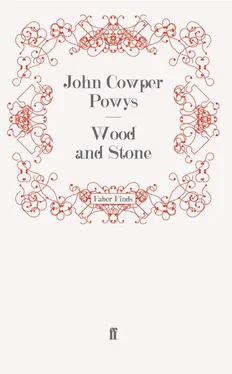He turned away his head and regarded with calm, placid detachment the rich, shadowy orchard and the golden buttercups.
The contours of his profile were so noble, and the pose of his head so majestic, that the agitated mother was soothed and awed into complete confidence.
“Thank God!” she exclaimed. “ That fear, at any rate, has passed. I shall be grateful to you forever, dear friend, for what you have just now said. It is a direct answer to my prayers.”
“May I, in my turn,” said Mr. Taxater, resuming his seat by her side, “ask you a bold and uncalled for question? What would you do, if in the changes and chances of this life, Vennie did come to regard Mr. Clavering with favour? Would you for a moment consider their union as a possible one?”
Valentia looked not a little embarrassed. Once more, in her heart, she accused the urbane scholar of a lack of delicacy and discretion. These little questions are not the ones to put to a perturbed mother.
However, she answered him plainly enough. “I should not like it, I confess. It would disappoint me. I am not ambitious, but sometimes I catch myself desiring, for my beloved child, a marriage that would give her the position she deserves, the position — pardon a woman’s weakness, sir! — that her ancestors held in this place. But then, again, I am only anxious for her happiness. No, Mr. Taxater. If such a thing did occur I should not oppose it, Mr. Clavering is a gentleman, though a poor one and, in a sense, an eccentric one. But I have no prejudice against the marriage of our clergy. In fact I think they ought to marry. It is so suitable, you know, to have a sensible woman endowed with such opportunities for making her influence felt. I would not wish Vennie to marry beneath her, but sooner than not see her married — well! — That is the kind of feeling I have about it, Mr. Taxater.”
“Thank you — thank you. I fear my question was impertinent; but in return for the solemn oath you exacted from me, I think I deserved some reward, don’t you? But seriously, Mrs. Seldom, I do not think that any of these less desirable fates will befall our dear child. I think she will marry a pillar of the aristocracy, and remain herself a pillar of the Anglican Church! I trust she will not, whatever happens, lose her regard for her old Catholic friend.”
He rose as he spoke and held out his hand. Mrs. Seldom took it in her own and held it for a moment with some emotion. Had he been a real Monsignor, he could not have looked more calm, more tolerant, more kind, than he looked at that moment. He wore the expression that high ecclesiastics must come to wear, when devoted but somewhat troublesome daughters of the church press close to kiss the amethystine ring.
A few minutes later he was passing out of the vicarage gate. The new brood of warblers that flitted about the tall bushes at that spot heard — with perfect unconcern — a mysterious Latin quotation issue from that restrained mouth. They could hardly be blamed for not understanding, even though they had migrated to these fields of heresy from more classic places, that the plain English interpretation of the dark saying was that all things are lawful to him whose motive is the “Potestas Civitatis Dei!”
He crossed the dusty road and was proceeding towards his own house, which was hardly more than a hundred yards away, when he saw through a wide gap in the hedge a pleasant and familiar sight. It was a hay-field, in the final stage of its “making,” surrendering to a great loose stack, built up beneath enormous elm-trees, the last windrows of its sweet-scented harvest.
Pausing for a moment to observe more closely this pleasant scene — for hay-making in Dorsal Field amounted to a village ritual — Mr. Taxater became aware that among the figures scattered in groups about the meadow were the very two whose relation to one another he had just been discussing. Vennie and the young clergyman were engaged in an animated conversation with three of the farm-boys.
Mr. Taxater at once climbed through the gap, and crossing the field approached the group unobserved. It was not till he was quite close that Vennie caught sight of him. Her pale, pinched little face, under its large hat, flushed slightly as she held out her hand; but her great steady grey eyes were full of friendly welcome.
Mr. Clavering too was effusive and demonstrative in his greeting. They chatted a little of indifferent matters, and the theologian was introduced to the shy farm-boys, who stared at him in rustic wonder.
Then Hugh Clavering said, “If you’ll pardon me for a moment, I think I ought to go across and speak to John Goring,” and he indicated the farmer’s figure bending over a new gleaning-machine, at the opposite end of the field. “Don’t go away, please, Mr. Taxater, till I come back. You will keep him, won’t you, Miss Seldom?”
He strode off; and the boys drifted away after him, leaving Mr. Taxater and the girl together, under the unfinished hay-stack. “I was so much wanting to speak to you,” began Vennie at once. “I very nearly ran in to the Gables; but I saw Mrs. Watnot over the wall, and she told me you were out. I am in serious need of advice upon a thing that is troubling me, and you are the only person who can really help.”
The expression of Mr. Taxater’s face at that moment was so sympathetic, and yet so grave, that one would hardly have been surprised to hear him utter the conventional formula of a priest awaiting confession. Though unuttered, the sacred formula must have been telepathically communicated, for Vennie continued without a pause, holding her hands behind her back, and looking on the ground. “Ever since our last serious conversation — do you remember? — after Easter, I have been thinking so much about that phrase of yours, referring to the Pope, as the eternal living defender of the idea of Love as the secret of the universe. Mr. Clavering talks to me about love — you know what I mean,” she smiled and blushed prettily, with a quick lifting of her head, “but he never gives me the feeling of something real and actual which we can approach on earth — something personal, I mean. And I have been feeling so much lately that this is what I want. Mr. Clavering is very gentle with me when I try to explain my difficulties to him; but I don’t think he really understands. The way he talks is beautiful and inspiring — but it somehow sounds like poetry. It does not give me anything to lay hands on.” And she looked into Mr. Taxater’s face with a pathetic wide-eyed appeal, as if he were able to call down angels from heaven.
“Dear child,” said the diplomatist, “I know only too well what you mean. Yes, that is the unfortunate and necessary limitation of a heretical church. It can only offer mystic and poetic consolations. It has lost touch with the one true Vine, and consequently the full stream of life-giving sap cannot flow through its veins.
“But I have felt so strengthened,” said Vennie mournfully, “by the sacrament in our Church; so strengthened and inspired! It seems dreadful that it should all be a sort of mockery.”
“Do not speak like that, dear child,” said Mr. Taxater. “God is good; and in his knowledge of our weakness he permits us to taste of his mystery even in forbidden cups. The motive in your heart, the faith in your soul, have been pure; and God has given to them some measure, though but an imperfect one, of what he will grant to your complete obedience.”
Vennie bent down and picking up a swathe of sweet-scented hay twisted it thoughtfully in her fingers. “God has indeed been working miracles on your behalf,” continued Mr. Taxater. “It must have been your guardian angel that led me to speak to you as I did at that time. For in future, I regret to say, I shall be less free. But the good work has been done. The seed has been sown. What follows must be at your own initiative.”
Читать дальше












